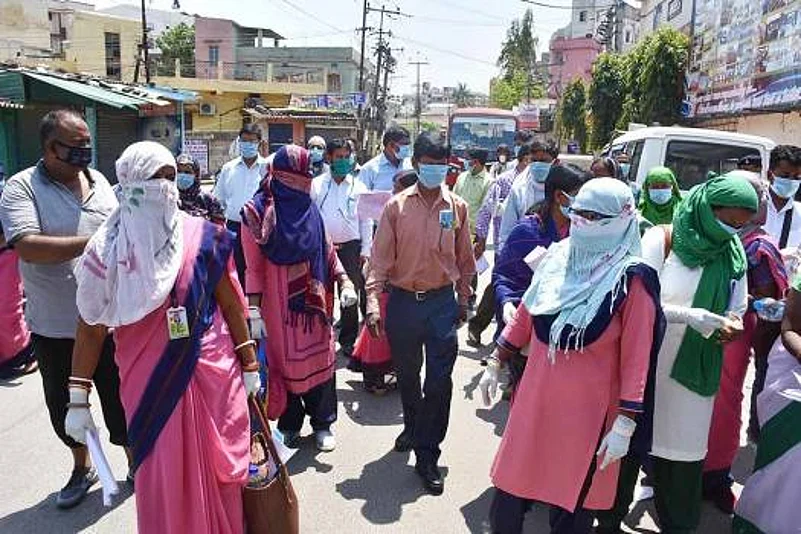When we look at magnificent structures, we usually notice their height, the ornate facades, the domes, and other embellishments. What we do not see and acknowledge is that the structure is strong only because of a good foundation. It is this foundation that ensures that the building doesn’t collapse during a storm, flood, earthquake or any other calamity.
Just like we need a strong foundation for a building, we also need it for our society. And in our country, millions of Anganwadi and ASHA (Accredited Social Health Activists) workers are helping build it. They play a critical role in promoting healthy practices, providing on-ground support, and spreading awareness about various health programmes of the Government of India. Essentially, they are the primary caregivers for financially weak rural women and their children. On the other hand, ASHA is the local implementation point of the National Rural Health Mission (NRHM). They are the first point of contact for the impoverished rural masses. We can now see ASHA workers forming the frontline of Covid-19 monitoring and undertaking door-to-door collection of health data during these critical times.
Advertisement
The government is focusing on making them frontline healthcare workers by imparting training. To achieve this objective, the Department of Personnel and Training has created an online platform for registration and training of health workers on a variety of topics such as infection prevention and control, ICU care and ventilation management and various Covid-19 related topics. This is a positive move that will lead to availability of large numbers of formally trained healthcare workers all over the country including urban as well as remote or rural areas.
As a part of the programme, the concerned department has issued detailed guidelines related to the creation of content on the topics listed by it. These provide a good idea of what topics need to be addressed and the processes related to the courses. However, these guidelines would lead to creating content which is more in the mould of information guides and do’s/don’ts. The purpose of the training should not just be dissemination of credible information, but to do it in a way that it is understood by the trainees and helps them when they go out in the field as caregivers. Hence, proper interactive training material must be created which makes it easier for them to learn. Converting the training materials into various regional languages is also important.
Advertisement
Another critical area that would determine the success of these trainings is the delivery system. It is of the utmost importance to clearly define the learning materials. This is where an organization like Portea Medical can bring in ample experience and expertise in training this resource pool by adopting a multiple channel strategy and imparting information through various real-time resources. For instance, a healthcare worker trained under this system should have the option to connect with an experienced nurse and seek guidance related to a patient’s condition whenever they face doubts related to the necessary steps.
Recently, the Indraprastha Institute of Information Technology Delhi (IIIT- Delhi) came up with a project called Sanghosti targeted at building a low-cost technology-enabled solution for empowering ASHA workers. The aim was to strengthen ASHA workers by educating them through innovative mobile learning platforms. In June 2019, IIIT-D also conducted a field deployment programme in Haryana for training ASHA workers on Home-Based Newborn Care with the help of PGIMER Institute (Chandigarh) and a NGO. The programme brought about positive results in terms of imparting knowledge to the ASHA workers as also direct benefits to the target families. Similar solutions can go a long way in empowering both Anganwadi and ASHA workers, and realizing their potential as health activists.
Despite their importance in the grand scheme of things, there is a lot of scope to empower the Anganwadi workers and ASHAs further and enhance their efficacy. Our country has a severe shortage of trained healthcare professionals, nursing attendants and doctors. Since the Anganwadi workers and ASHAs are familiar with hygiene, first aid, value of nutrition and other such concepts, they can be turned into skilled basic healthcare providers with the right training, beyond the current Covid-19 pandemic. There is always a need for better healthcare and these trained personnel can be invaluable to any community or universal healthcare schemes that the government may launch in future. Another key requirement is to bring them under the ambit of mainstream healthcare services. The government has recently announced that they will also be given insurance benefits like the doctors, nurses, nursing attendants and other medical staffs. This is a welcome move and once they are given recognition as healthcare workers, their social acceptance and motivation is also bound to be much higher than present.
Advertisement
(The author is MD & CEO, Portea Medical. Views expressed are personal.)




















